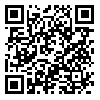2- Department of Nursing, The Persian Gulf Tropical Medicine Research Center, The Persian Gulf Biomedical Research Institute, Bushehr University of Medical Sciences, Bushehr, Iran ,
3- Department of Nursing, School of Nursing and Midwifery, Bushehr University of Medical Sciences, Bushehr, Iran
4- Deputy of Research, Bushehr University of Medical Sciences, Bushehr, Iran
Background: Fever is one of the most common reasons for which parents of infants and young children seek medical care. This study aimed to understand the problems of parents in the care and management of febrile children in depth and ultimately provide ways to resolve this issue. Materials & Methods: The present study is a descriptive exploratory research (a kind of mix method design) with the aim of examining the problems of managing fever in children by their parents. The study population was parents of children referred to health centers in Bushehr. The study sample was purposively selected. Data collection included semi-structured interviews, demographic information and empowering questionnaire. The qualitative data were analyzed based on directed content analysis. The quantitative data was analyzed using the SPSS software (version 19) and descriptive and analytical statistics at a significance level of 0.05. Results: In the qualitative study, coding and condensing data from interviews determined in six categories, including: the need for awareness, preparedness for coping, acting independently performance of effective care, sense of control and management positions and satisfaction. The mean and standard deviation of the scores of knowledge, attitude and practice of parents were, 6.65±1.58, 11.87±3.41 and 55.44±5.97, respectively. In addition, scores of empowering in terms of some demographic characteristics showed significant correlation. Conclusion: The need for basic information about how to manage fever and also need to empowering mothers in such a way to be prepared enough to cope with fever were presents in most of participants’ interviews. It is recommended that health workers provide the parents more complete education by empowerment models to reach satisfactory abilities in managing their children,s fever.
Received: 2014/05/19 | Accepted: 2014/08/31 | Published: 2015/09/12
| Rights and Permissions | |
 |
This work is licensed under a Creative Commons Attribution-NonCommercial 4.0 International License. |


